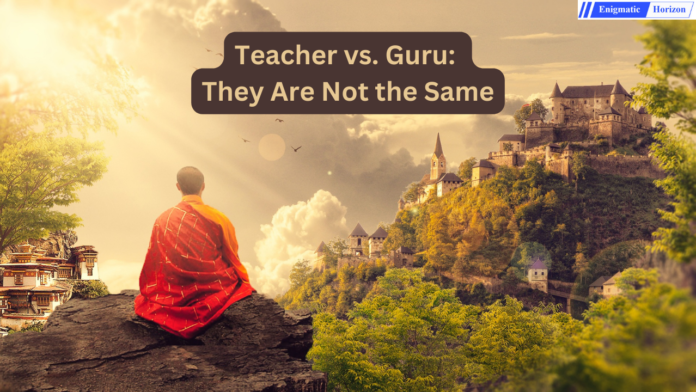Priyal Dholakia (Assistant Editor)
गुरुर्ब्रह्मा गुरुर्विष्णुः गुरुर्देवो महेश्वरः गुरुः साक्षात् परं ब्रह्म तस्मै श्री गुरवे नमः॥
Meaning: The Guru is Brahma (the Creator). The Guru is Vishnu (the Preserver). The Guru is Maheshwara (the Destroyer). The Guru is verily the Supreme Brahman (the Ultimate Reality); Salutations to that Guru.
This profound Sanskrit shloka beautifully encapsulates the essence of the guru-disciple relationship. The importance of a guru to one’s own development as a spiritual being is emphasised. Moreover, the shloka highlights that a guru is not just a teacher. Instead, he is a spiritual guide who brings us to the realisation of our own selves as well as the absolute truth.
However, nowadays, “teacher” and “guru” are misunderstood to be synonymous. But that is untrue. Both teacher and guru carry distinct connotations and roles that set them apart. Both help to instruct and guide. However, their approaches, relevance, and functions in a person’s life differ. Being a teacher and having the status of a guru are two very different things. Let us see how.
The function of a teacher
A professional with training in a certain area or industry is a teacher. He or she teaches students in a methodical and structured way. A formal environment, like a classroom, defines the teacher-student relationship. Lectures, texts, and assignments are used to spread knowledge in this setting. Teachers conform to educational standards and follow curricula. And often focus on preparing students for examinations or assessments.
Teachers unquestionably contribute significantly to the knowledge and skills we acquire. But their role is largely limited to the academic domain. They can inspire and motivate students, but mainly within their subject.
The Guru’s Position
A guru, on the other hand, is a spiritual guide or mentor who goes beyond conventional education. In Indian spiritual tradition, the idea of a guru is well-rooted. It is centred on a strong bond between the mentor and the disciple. The guru-shishya parampara (guru-disciple relationship) is considered to be highly sacred. Wisdom, life lessons, and spiritual insights are what the guru teaches his disciple. Unlike teachers, gurus are not limited to academic subjects alone. In the personal, emotional, and spiritual journeys of life, they lead their disciples.
Gurus are revered figures and given an equal pedestal with God in Indian culture. In one’s life, they function similarly to a directing influence and a guiding light. The bond between a guru and his student is one built on a lifetime of devotion.
Through storytelling, dialogue, and experience, gurus teach deeply. The disciple’s consciousness and inner awareness are their goals. Gurus emphasise the development of the person as a whole, most importantly. The growth of the whole person, not just the mind, is emphasised in their lessons. Finding meaning, purpose, and fulfilment can be helped by a guru. Under a guru’s guidance, one can experience profound shifts in perspective. In a way, gurus guide changes in a person’s attitudes, convictions, and general way of living.
Being a guru is no easy feat compared to being a teacher. A guru has to abide by strict rules to lead a pious life. These include following brahmacharya (celibacy), abstaining from meat, etc. Spiritual leaders, or “gurus,” are highly respected figures in many religions. So they have to lead by example and adhere to steadfast discipline and self-control. They educate from deep wisdom and spirituality. Teachers, however, might come from different backgrounds and live a variety of lives. However, a guru has to shoulder spiritual and ethical responsibilities as well.
Summing up,
Teaching is merely a profession, whereas Gurutva is a mode of enlightenment. A guru has the same status as a god in Indian tradition. Hence, we should ensure that we retain the sanctity of a guru’s title and do not use it casually.
Keep following Enigmatic Horizon for more of such interesting content. If you are into gaming, check some of our latest gaming articles such as the impact of virtual reality in gaming, and the top 5 confirmed AAA titles coming on Nintendo Switch.
